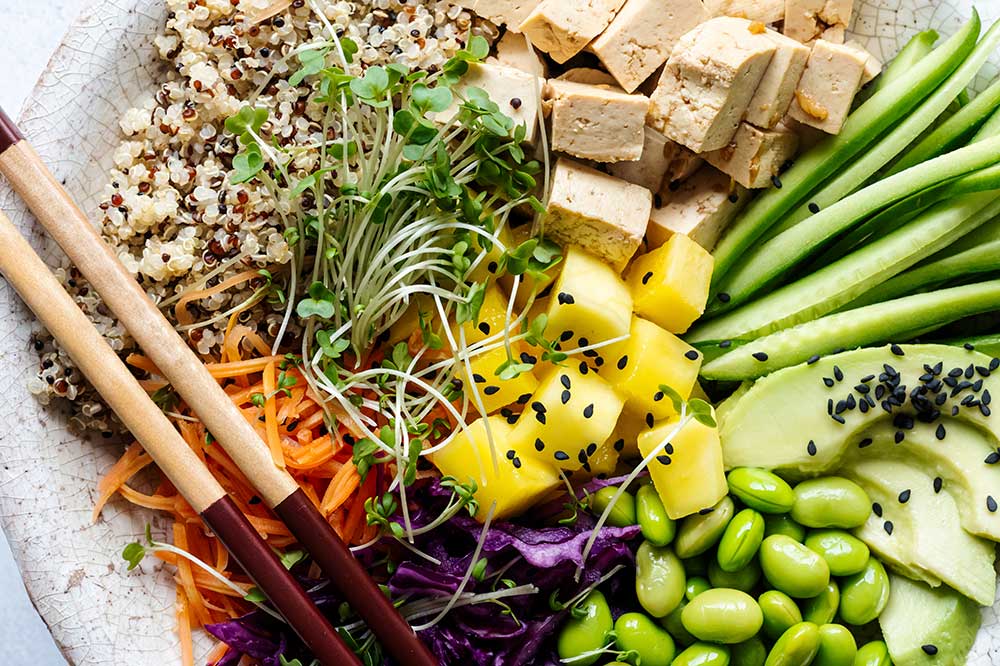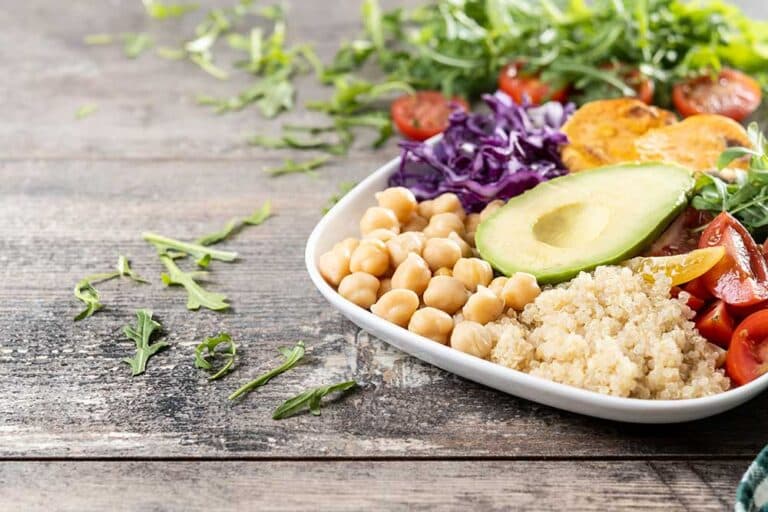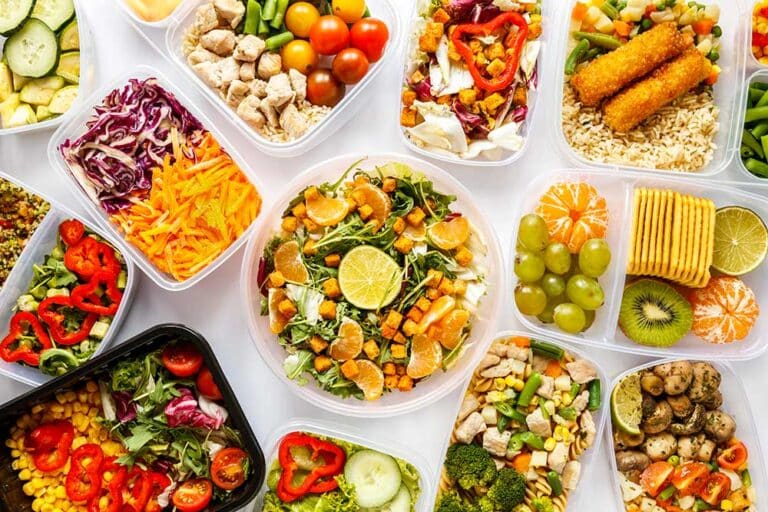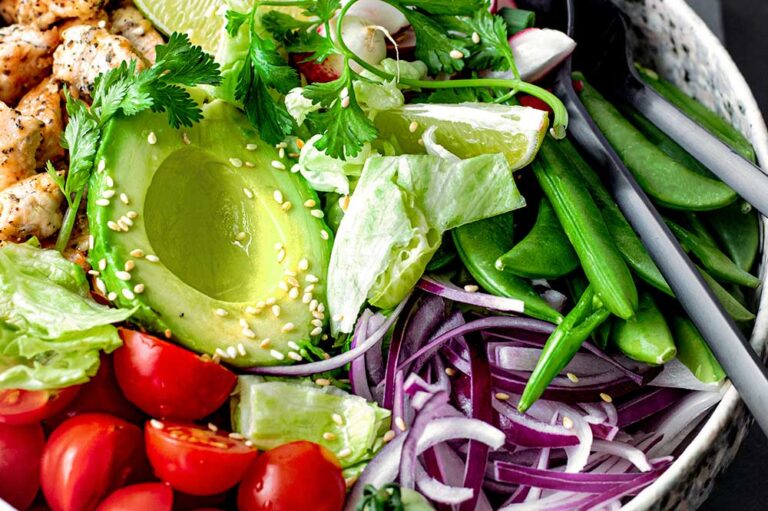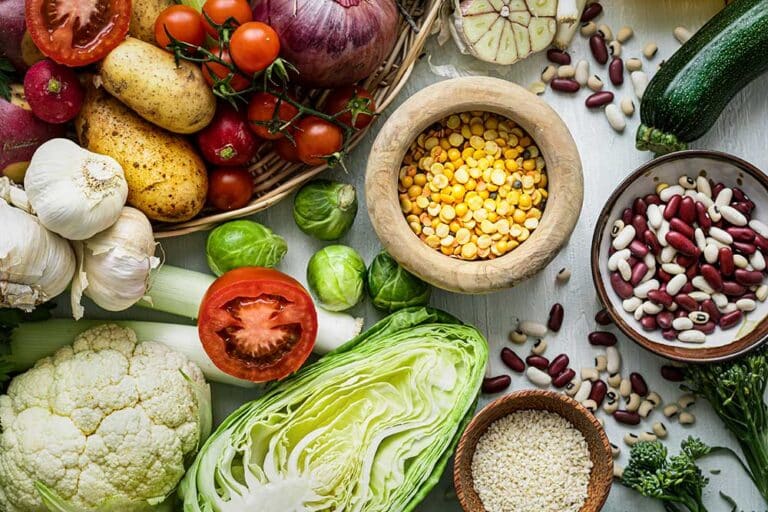Understanding Plant-Based Diets
Plant-Based Diet vs. Vegan Diet
The terms “plant-based diet” and “vegan diet” are often used interchangeably, but they have distinct differences.
A plant-based diet primarily focuses on consuming foods derived from plants. This includes fruits, vegetables, legumes, grains, nuts, and seeds, with a minimal or complete exclusion of animal products. People who follow a plant-based diet may occasionally consume animal products but generally strive to eat mostly whole, raw, or minimally processed plant foods (Healthline).
In contrast, a vegan diet goes beyond just dietary choices and represents a lifestyle dedicated to avoiding the consumption, use, and exploitation of animals. This means no meat, poultry, fish, dairy, eggs, or honey are consumed. Additionally, veganism extends to areas such as clothing, personal care products, and household items that might involve animal byproducts or testing on animals (Healthline).
| Aspect | Plant-Based Diet | Vegan Diet |
|---|---|---|
| Primary Focus | Diet, mostly plant foods | Lifestyle, no animal exploitation |
| Animal Products | Minimizes or excludes | Completely excludes |
| Processed Foods | Minimally processed | Can include processed vegan foods |
| Lifestyle | Generally pertains to diet | Extends to clothing, personal care, etc. |
For more information on the differences between these diets, visit our article on plant-based diet benefits.
Benefits of a Plant-Based Diet
Adopting a plant-based diet offers numerous health benefits, making it an attractive option for those looking to improve their overall well-being.
-
Improved Heart Health: Diets rich in fruits, vegetables, whole grains, nuts, and seeds are associated with a reduced risk of heart disease. Plant-based diets can help lower cholesterol levels, blood pressure, and reduce inflammation, all of which contribute to a healthier heart (Food Revolution Network).
-
Weight Management: Plant-based diets are often lower in calories and high in fiber, aiding in weight loss and maintenance. The consumption of nutrient-dense foods helps regulate appetite and improve digestion. More details on this can be found in our article on plant-based diet and weight loss.
-
Lower Risk of Chronic Conditions: Following a plant-based diet can reduce the risk of developing chronic diseases such as type 2 diabetes, certain cancers, and hypertension. The antioxidants and phytochemicals present in plant foods contribute to this protective effect.
-
Enhanced Nutrient Intake: Eating a variety of plant foods ensures a rich intake of essential vitamins, minerals, and antioxidants. This diet supports optimal functioning of the immune system and provides energy for daily activities. Learn more about how to manage nutrient intake on our page about high protein plant-based foods.
-
Environmental Impact: Plant-based diets are more sustainable and have a lower carbon footprint compared to diets heavy in animal products. Adopting a plant-based diet can significantly reduce individual contributions to environmental degradation. Discover more about sustainability in our section on plant-based diet meal plan.
For additional benefits and detailed information, refer to our article on the benefits of plant-based eating.
Transitioning to a Plant-Based Diet
Starting Your Plant-Based Journey
Embarking on a plant-based diet can seem overwhelming, but gradually making the change is often more sustainable. Instead of overhauling your diet overnight, try setting smaller, manageable goals. Begin by incorporating more vegetables, fruits, whole grains, and legumes into your daily meals. Over time, eliminate animal-based products and replace them with plant-based alternatives.
Here are some simple swaps to get you started:
- Cow’s milk can be replaced with oat, almond, or soy milk.
- Eggs in baking can be substituted with flax seed eggs.
- Dairy yogurt can be swapped out for soy or coconut yogurt.
- Poultry can be substituted with legumes or soy products like tofu or tempeh.
Overcoming Common Challenges
Switching to a plant-based diet can present several challenges, particularly if you’re new to it. One common issue is ensuring you get enough protein from plant-based sources. Refer to our guide on plant-based diet protein sources for options like legumes, nuts, and tofu. Additionally, preparing balanced meals might require more planning initially. Prepping meals in advance a couple of times per week can simplify the process (Parkview).
Consuming plant-based meals can also be cost-effective. On average, vegans may save around $750 annually compared to those following an omnivorous diet. Stock up on vegetables, fruits, whole grains, and legumes to keep your meals nutritious and budget-friendly (Parkview).
Planning Meals Successfully
Meal planning is a key aspect of transitioning to a plant-based diet successfully. It helps ensure that you consume a variety of nutrients and prevents last-minute unhealthy choices. Follow these meal planning tips:
- Plan Ahead: Set aside time each week to plan your meals. This allows you to create a diverse and balanced menu.
- Prep Ingredients: Prepare items like legumes, vegetables, and whole grains ahead of time. This will make assembling meals quicker and easier.
- Utilize Leftovers: Make use of leftovers for next-day meals or turn them into a new dish.
| Day | Breakfast | Lunch | Dinner |
|---|---|---|---|
| Monday | Oatmeal with Almond Milk & Berries | Quinoa Salad | Chickpea Stir-Fry |
| Tuesday | Smoothie with Spinach & Bananas | Lentil Soup | Tofu Tacos |
| Wednesday | Avocado Toast | Hummus Wrap | Spaghetti with Tomato Sauce |
| Thursday | Plant-Based Yogurt with Nuts | Veggie Burger | Stuffed Peppers |
| Friday | Chia Seed Pudding | Falafel Bowl | Veggie Curry |
For more plant-based diet meal plan ideas and recipes, check out our dedicated section on plant-based diet recipes.
Ensuring you include healthy fats in your meals is essential. Foods like avocado oil, nuts, and seeds can help you feel full longer and add various health benefits (Piedmont Healthcare).
By following these steps, you can effectively transition to a plant-based diet, overcome common challenges, and enjoy the benefits of plant-based eating for optimal health.
Essential Nutrients in a Plant-Based Diet
Maintaining a balanced plant-based diet for beginners requires attention to essential nutrients to ensure optimal health. Key nutrients include protein, iron, calcium, omega-3 fatty acids, and vitamin B12.
Protein Sources in Plant-Based Diets
Protein is crucial for muscle repair, immune function, and overall health. A common concern with plant-based diets is obtaining sufficient protein. However, there are diverse and rich protein sources available.
| Plant-Based Protein Source | Protein Content (per 100g) |
|---|---|
| Lentils | 9g |
| Chickpeas | 19g |
| Quinoa | 14g |
| Tofu | 8g |
| Chia Seeds | 17g |
For more information, refer to high protein plant-based foods.
Ensuring Sufficient Iron and Calcium
Iron and calcium are vital minerals that need careful monitoring in a plant-based diet.
Iron
Iron from plant sources (non-heme iron) is less readily absorbed by the body compared to heme iron found in meat. Nevertheless, a plant-based diet can meet iron requirements with the right choices.
| Plant-Based Iron Sources | Iron Content (per 100g) |
|---|---|
| Spinach | 2.7mg |
| Lentils | 3.3mg |
| Chickpeas | 2.9mg |
| Tofu | 5.4mg |
| Pumpkin Seeds | 13.6mg |
Increasing vitamin C intake with foods like red peppers, kale, and oranges can enhance non-heme iron absorption.
Calcium
Calcium is essential for bone health, and several plant sources can provide adequate calcium.
| Plant-Based Calcium Sources | Calcium Content (per 100g) |
|---|---|
| Kale | 150mg |
| Broccoli | 47mg |
| Fortified Almond Milk | 188mg |
| Tofu (calcium-set) | 350mg |
| Black Beans | 102mg |
For further reading, visit plant-based diet benefits.
Omega-3 Fatty Acids and Vitamin B12
Omega-3 fatty acids and vitamin B12 are critical nutrients that may require supplementation or carefully sourced foods in a plant-based diet.
Omega-3 Fatty Acids
Plant sources of Alpha-linolenic acid (ALA), which converts to EPA and DHA in the body, include:
| Plant-Based Omega-3 Sources | Omega-3 Content (per 100g) |
|---|---|
| Chia Seeds | 17.8g |
| Flaxseeds | 22.8g |
| Walnuts | 9.1g |
| Hemp Seeds | 9.3g |
Daily consumption of these foods helps maintain optimal omega-3 levels (Down to Earth).
Vitamin B12
Vitamin B12 is primarily found in animal products, and plant-based eaters may need to rely on fortified foods or supplements. Consider supplements and fortified foods like nutritional yeast, plant milks, and fortified cereals.
For more on meal ideas, explore plant-based diet recipes.
Providing your body with these essential nutrients through a well-planned plant-based diet can offer numerous health benefits. To learn more about starting your journey, check out how to start a plant-based diet.
Meal Planning and Recipes
Adopting a plant-based diet can be both exciting and challenging for beginners. Planning meals that are both nutritious and easy to prepare is essential for a smooth transition. This section provides simple breakfast ideas, budget-friendly recipes, and meal prep tips to ensure success on your plant-based journey.
Simple Plant-Based Breakfast Ideas
Starting the day with a nutrient-rich breakfast sets a positive tone for the rest of your meals. Here are some delicious and easy-to-make plant-based breakfast options:
- Overnight Oats: Combine rolled oats, plant-based milk (such as almond or oat milk), chia seeds, and your choice of fruits. Let it sit overnight and enjoy a ready-to-eat breakfast in the morning.
- Smoothie Bowls: Blend frozen berries, bananas, spinach, and a plant-based protein powder. Top with granola, nuts, and seeds.
- Avocado Toast: Spread ripe avocado on whole-grain toast. Sprinkle with salt, pepper, and a dash of lemon juice.
- Chia Pudding: Mix chia seeds with plant-based milk and a bit of maple syrup. Let it sit for a few hours or overnight until it thickens. Top with fresh fruits and nuts.
- Tofu Scramble: Crumble tofu and sauté with bell peppers, onions, spinach, and turmeric. Serve with whole-grain toast.
Budget-Friendly Plant-Based Recipes
Eating a plant-based diet doesn’t have to be expensive. Here are some budget-friendly meal ideas to keep your wallet happy while nourishing your body:
| Recipe | Ingredients | Estimated Cost |
|---|---|---|
| Black Bean Burgers | Black beans, oats, onions, spices | $5 |
| Lentil Soup | Lentils, carrots, celery, tomatoes, spices | $4 |
| Chickpea Salad Sandwich | Chickpeas, celery, vegan mayo, mustard, whole-grain bread | $3 |
| Vegetable Stir-Fry | Mixed vegetables, tofu, soy sauce, brown rice | $6 |
| Vegan Chili | Black beans, kidney beans, corn, tomatoes, spices | $7 |
For more budget-friendly recipes, explore our plant-based diet recipes section.
Meal Prep Tips for Success
Effective meal prepping can save time and ensure you always have healthy plant-based meals on hand. Here are some tips:
- Plan Ahead: Create a weekly meal plan that includes breakfast, lunch, dinner, and snacks. This helps prevent last-minute unhealthy choices.
- Batch Cooking: Prepare large batches of grains, beans, and roasted vegetables. Store them in the refrigerator or freezer for quick, easy meals throughout the week.
- Use Versatile Ingredients: Choose ingredients that can be used in multiple dishes. For example, cooked quinoa can be added to salads, soups, and even scrambled tofu.
- Store Properly: Invest in good-quality food storage containers to keep your meals fresh. Label containers with the name and date to easily keep track of what you have.
- Prep Snacks: Prepare healthy snacks like carrot sticks, hummus, and mixed nuts. Having these ready eliminates the temptation to snack on less healthy options.
Applying these meal prep tips can make following a plant-based diet for beginners much more manageable. For more detailed meal planning guidance, visit our plant-based diet meal plan page.
These strategies and recipes not only support optimal health but are also aligned with the benefits of plant-based eating, including improved heart health and reduced risk of chronic conditions (Harvard Health Publishing).
By implementing these meal planning tips and recipes, individuals can enjoy a variety of delicious and nutritious plant-based meals while sticking to a budget and making meal prep a breeze. For more on optimizing your plant-based diet, check out our articles on plant-based diet benefits and how to start a plant-based diet.
Health Benefits of a Plant-Based Diet
Disease Prevention and Health Improvement
Adopting a plant-based diet for beginners comes with numerous health benefits, particularly in preventing diseases and improving overall health. According to research from Parkview, whole food plant-based diets and plant-forward diets can help prevent several diseases, including Type 2 diabetes, hypertension, cardiovascular diseases, and certain types of cancer. Additionally, this type of diet can enhance digestion, microbiome diversity, and insulin sensitivity.
Impact on Heart Health
A plant-based diet can have a significant positive impact on heart health. Consuming nutrient-dense plant-based foods, such as vegetables, fruits, whole grains, beans, legumes, and nuts, decreases the risk of poor heart health. As referenced by the American Heart Association, such diets are associated with a lower risk of death from cardiovascular diseases.
Replacing meats, especially processed ones, with plant-based foods reduces exposure to cholesterol and saturated fats that negatively impact heart health. Instead, opting for lean proteins like beans, nuts, legumes, and plant-based sources ensures healthier outcomes.
Lowering Risk of Chronic Conditions
Switching to a plant-based diet can also lower the risk of various chronic conditions. Research indicates that these diets may protect against chronic diseases like heart disease, cancer, and diabetes. By reducing meat consumption and focusing on the intake of vegetables, fruits, whole grains, and legumes, individuals can significantly decrease their exposure to unhealthy fats and cholesterol.
A well-planned plant-based diet supports better weight management, which in turn reduces the risk of obesity-related conditions. For an extensive overview of diet structure and meal preparations, check out our plant-based diet meal plan.
| Health Benefits | Impact |
|---|---|
| Cardiovascular Health | Lower risk of death from cardiovascular diseases |
| Disease Prevention | Reduced risk of Type 2 diabetes, hypertension, breast, colorectal, and prostate cancer |
| Overall Health Improvement | Enhanced digestion, improved blood cholesterol levels, better weight management |
For more on the health benefits of a plant-based diet, including its impact on long-term well-being, visit benefits of plant-based eating and plant-based diet benefits. This aligns with leading health advice and ensures comprehensive understanding for beginners.
Sustainability and Environmental Impact
Plant-Based Diet and Environmental Concerns
Transitioning to a plant-based diet can have a significant positive impact on the environment. One of the primary benefits is the reduction in greenhouse gas emissions. The production of plant-based foods generally produces fewer emissions compared to the raising of animals for meat. Additionally, plant-based diets typically require less water and land, contributing to a reduction in deforestation and conserving vital natural resources (American Heart Association).
| Environmental Impact | Plant-Based Diet | Omnivorous Diet |
|---|---|---|
| Greenhouse Gas Emissions | Lower | Higher |
| Water Usage | Lower | Higher |
| Land Usage | Lower | Higher |
Supporting Sustainable Food Practices
Following a plant-based diet means opting for more sustainable food practices. This involves choosing locally-sourced, seasonal produce, which reduces the carbon footprint associated with transporting food long distances. Additionally, purchasing organic foods when possible supports farming practices that are better for the environment.
Sustainable food practices also include minimizing food waste by planning meals in advance and composting food scraps. Engaging in sustainable habits such as these can make the transition to a plant-based diet more meaningful and impactful (Parkview). For more on planning meals ahead, visit plant-based diet meal plan.
Ethical Considerations
For many, a plant-based diet is not solely about health and environmental benefits, but also ethical considerations. Choosing plant-based over animal-based products often aligns with the values of reducing animal suffering and supporting animal rights. By eliminating or reducing the intake of animal products, individuals can contribute toward a decrease in demand for factory farming, which is often associated with poor animal welfare conditions.
Moreover, ethical farming practices that prioritize humane treatment of animals often align well with the principles of a plant-based diet. These considerations can inspire people to commit to and maintain their dietary choices (Parkview). For more on how to begin this journey, explore how to start a plant-based diet.
- About the Author
- Latest Posts
Johnnie D. Jackow Sr., the founder and CEO of Total Body Fitness, Worldwide, has a long-standing career in the fitness industry. He began as a certified personal trainer in the mid-90s and soon after authored his first weight loss book in 1998. This led to the launch of Total Body Fitness, Nationwide in the USA at the same time. Johnnie gained recognition as the fitness guru of his time, running infomercials on local TV late at night in Houston, Texas. Over the years, he has helped more than 40,000 individuals from all over the world achieve their health and fitness goals. With over 60,000 hours of documented training in integrative functional medicine, he completed his PhD in human physiology in 2010. His primary objective is to assist people in reaching their health and fitness goals through alternative approaches rather than relying solely on conventional medicine and pharmaceutical drugs. Today, with almost three decades of experience under his belt, Johnnie continues to be a leader in health and fitness.

